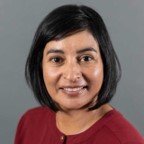
We are excited to feature Julie Lucero, PhD, MPH for our March 2022 edition of "Spotlight On."
Dr. Lucero (she/her/ella) joins the University of Utah as the inaugural College of Health Associate Dean for Equity, Diversity, & Inclusion as well as Associate Professor in Health and Kinesiology.
Tell us a little bit about yourself.
I grew up in Española, New Mexico, a small town in the Northern part of the state. Its position is interesting; located near Los Alamos, Santa Fe, and Taos—three affluent towns—as well as Muslim and Sikh religious communities and is surrounded by the eight Northern American Indian Pueblos. I credit growing up with these different groups for my diversity interest. It wasn’t until I began studying at the University of New Mexico that I began to understand the inequities prevalent in my hometown.
Social injustice and health disparities experienced by underrepresented populations drove me to the fields of Public Health and Health Communication. While completing my master’s program and after, I worked as university staff, which helped with tuition costs. During those years, I witnessed how staff, students, and those without terminal degrees were not actively engaged in decision-making. These individuals were at the table, but their voices could be quickly reduced, or ideas taken and reframed by someone with more education or in a higher position. This encouraged my thinking about inclusion. It is not enough to bring diversity to the table; individuals from diverse backgrounds need to be heard and their ideas acted upon. I decided to pursue a doctoral degree so that I could be a diverse voice and encourage others to join me.
While going through graduate school, I felt guilty reading anything other than peer-reviewed journal articles or other scholarly work required by classes or research projects, so I started listening to audiobooks while I exercised, did yard work, or was in the car. I still really enjoy a good audiobook.
What is your vision for the College of Health?
The College of Health already has a robust vision for equity, diversity, and inclusion. I am fortunate to step into this position, working with a motivated and prepared faculty. These initial months will be dedicated to assessing the climate and understanding the landscape. From there, the areas that require resources and programming will become clear. Ultimately, I want the College of Health to be a place where students want to study and spend time and where faculty and staff want to work, collaborate, and advance careers.
Why did you want and choose to take this role?
My career has been dedicated to reducing health disparities through education, research, and policy. In doing this work, I came to understand the immense impact of upstream factors, or social determinants of health, such as education attainment, housing, and all the -isms (e.g., racism, sexism, ableism, ageism, among others). This position provides me the control to assess a climate and create programming to increase opportunity, a sense of belonging, and correct inequities.
Additionally, through the UHealth EDI workgroup, I have a network of support to share ideas and resources. This position is ideal for me at this point in my career. Equally important, the position brought me closer to family, which is also significant at this point in my life.
Sometimes folks look at EDI-focused careers and work as not being enough to prepare for other leadership roles outside of EDI departments. How do you feel this work does or can help benefit and advance your career as well as your close collaborators and partners?
Working in the EDI space requires traditional leadership skills, such as organization, ability to delegate, clear communication, and decision-making, among others. In addition, EDI professionals also need to be flexible, creative and strategic, empathetic, an active listener and motivator, persuasive, diplomatic, and inspire change. These skills are transferable to any leadership position with the added benefit of knowing the business case for equity, diversity, and inclusion.
Businesses that centralize EDI are more profitable, have a list of qualified applicants wanting to work in the organization, retain their workforce, and generate new and innovative products. Leaders with EDI experience are better equipped for the up and coming workforce. Those who make up the current young adult and adult populations are among the most diverse of generational cohorts; diversity is increasing through interracial/ethnic marriages, immigration, refugees and asylum seekers, as well as internal US migration.
What is your “why”?
The lack of opportunity is an overlooked social determinant of health. Throughout history, opportunity has been reserved for certain groups, and this has resulted in social and health inequity. This needs to change; the existing state of affairs isn’t good enough. As a society, we can do better.
5 Fun Facts
- Favorite quote or piece of advice: “I’ve learned that people will forget what you said, people will forget what you did, but people will never forget how you made them feel.” --Maya Angelou
- Favorite book(s)
- The Sun Also Rises by Ernest Hemingway
- Eloquent Rage: A Black Feminist Discovers Her Superpower by Brittney Cooper
- What is your “get energized” or “feel good” song? Anything from Electric Light Orchestra. “Sweet Talkin’ Woman” is a go-to.
- Favorite series (movie, book, tv, etc.): Reservation Dogs (TV series) – highly recommend
- If you could have one superpower, what would it be? Change anger to curiosity. Anger is such a quick reaction that can blind us. If we could change that initial reaction to curiosity—ask “why” first. I expect we would come to understand those who are not like us.